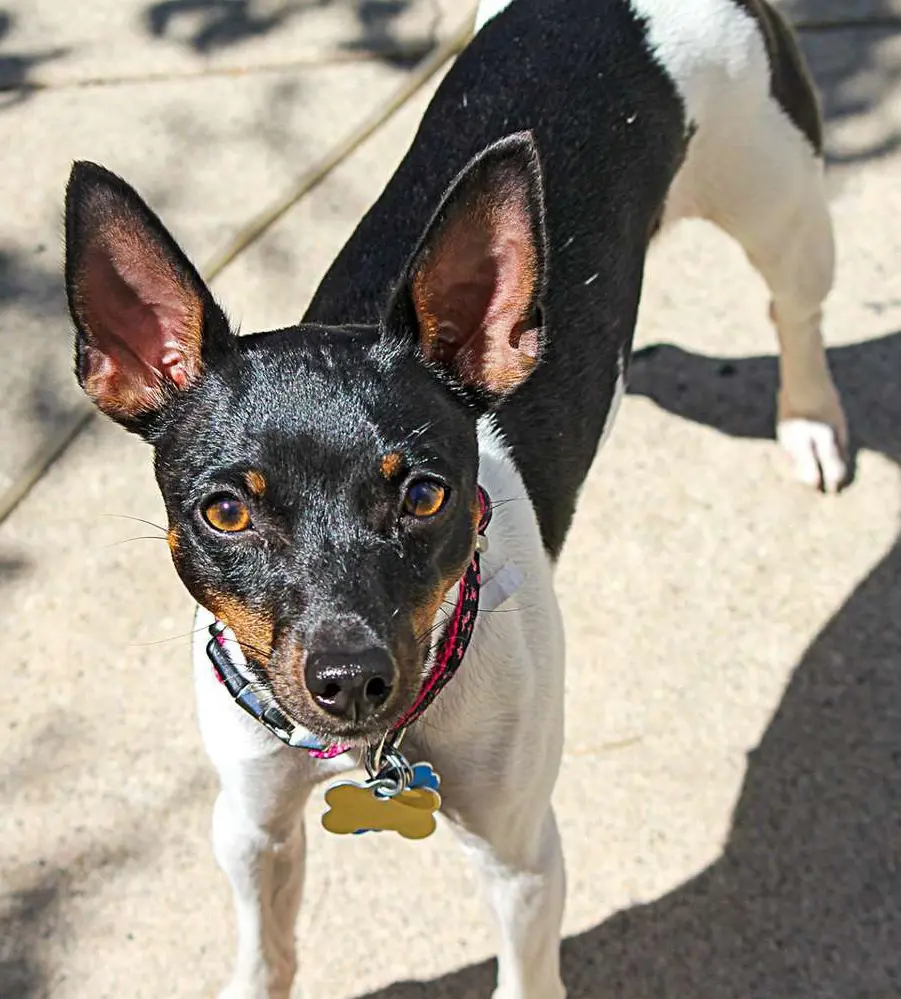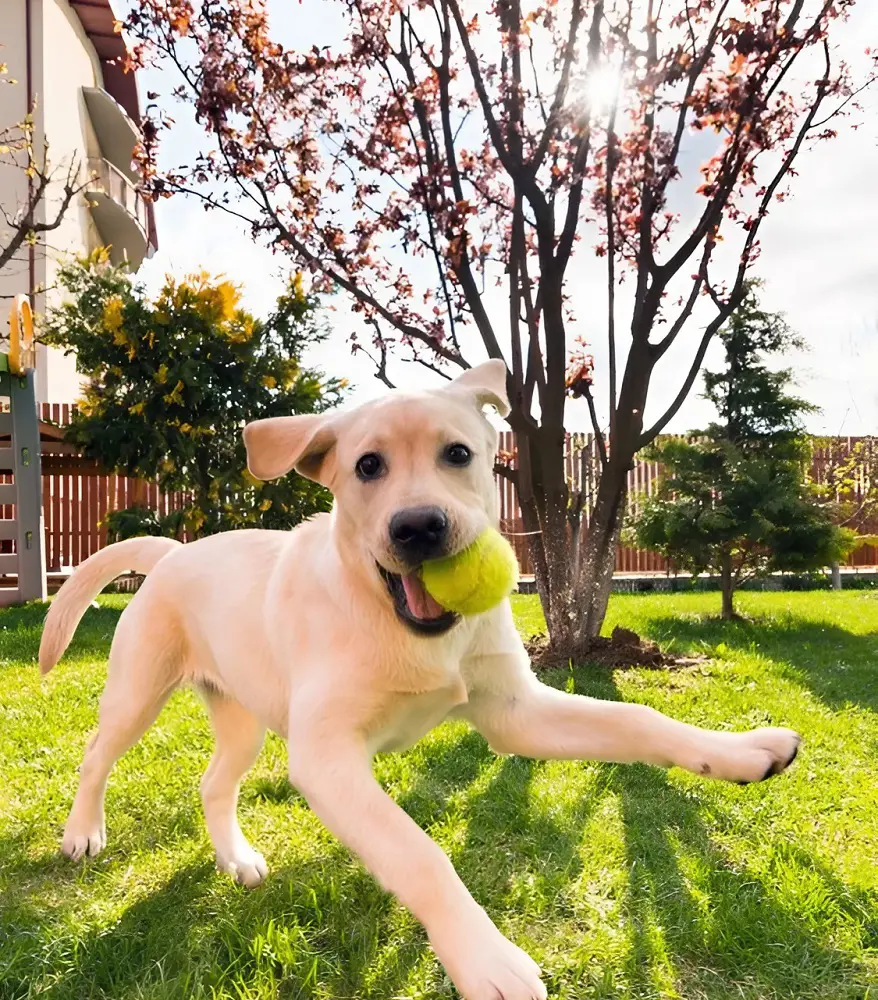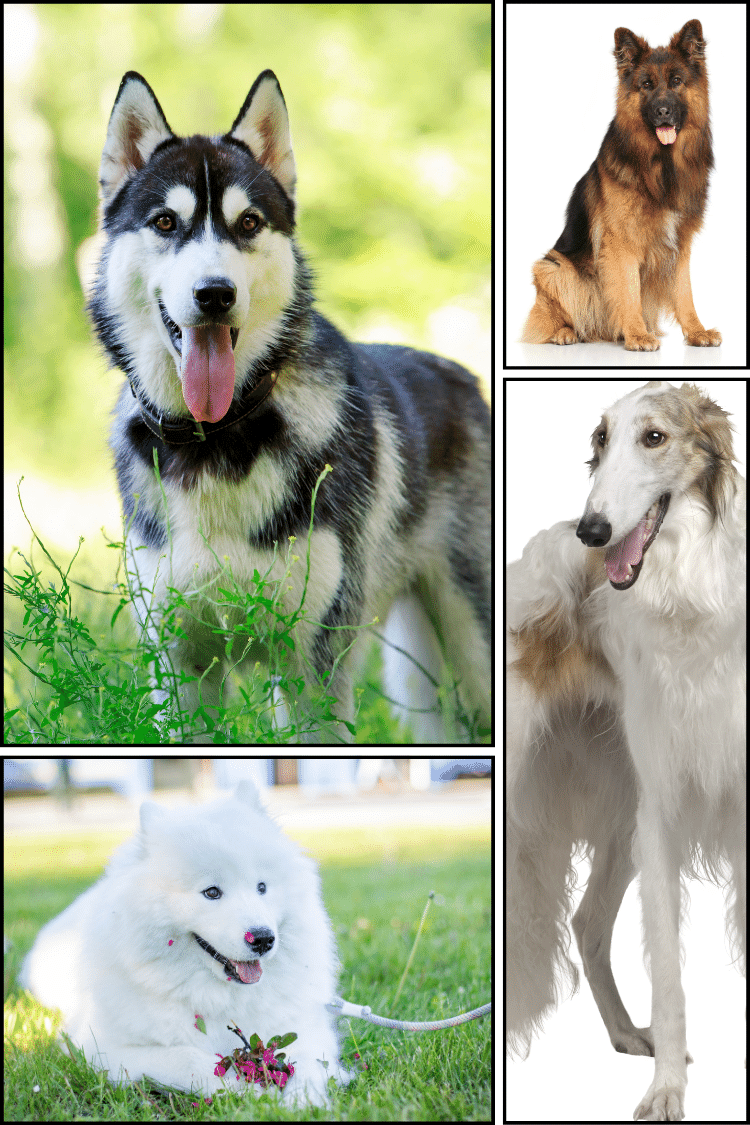Rat Terrier Dog Breed Information And Characteristics

The Rat Terrier is a lively and intelligent breed known for its energetic personality and versatile nature. Originally bred for hunting and farm work, these compact dogs are beloved for their agility and strong prey drive.
With a friendly disposition and loyal temperament, Rat Terriers make excellent companions for active families. This article explores the key characteristics, care requirements, and unique traits that define the Rat Terrier.
Overview Of Rat Terrier Dog Breed
The Rat Terrier is a small to medium-sized breed known for its energetic, intelligent, and friendly nature. The general overview of this dog are mentioned below:
- Origin: The United States
- Group: Terrier
- Height: 10 to 13 inches (miniature); 13 to 18 inches (standard)
- Weight: 10 to 25 pounds
- Lifespan: 12 to 18 years
- Coat Type: Smooth, shiny, and short coat
- Coat Color: White, black, brown, tan, gray
- Temperament: Intelligent, inquisitive, affectionate, lively, alert, loving
- Hypoallergenic: No
The Rat Terrier is a small to medium-sized American dog breed known for its agility, intelligence, and energetic nature. These dogs have gained popularity as family pets due to their friendly and adaptable personalities.
Rat Terriers are generally good with children and can get along with other pets if properly socialized. They are loyal, playful, and alert, making excellent watchdogs.
These require moderate exercise and mental stimulation. Their intelligence makes them highly trainable, but they can be stubborn at times. With proper care and attention, they make loving and entertaining companions.
Rat Terrier Breed History

The Rat Terrier, a distinctly American breed, has a rich history rooted in the nation's agricultural and hunting traditions. Developed in the late 19th and early 20th centuries, this breed was created to meet the needs of farmers for an efficient vermin hunter and versatile farm dog.
By crossbreeding various terrier types such as the Fox Terrier, Manchester Terrier, and Bull Terrier, breeders aimed to combine the best traits of each to produce a small, agile, and tenacious dog.
In the early 20th century, additional breeds like the Whippet and Beagle were introduced to enhance the Rat Terrier's speed, agility, and tracking abilities.
During the 1920s and 1930s, Rat Terriers became essential on American farms, valued for their effectiveness in controlling vermin populations. Despite the decline in their traditional roles due to modern pest control methods, Rat Terriers' versatility and charm ensured their survival.
Recognized by the United Kennel Club in 1999 and the American Kennel Club in 2013, Rat Terriers today are celebrated for their agility, intelligence, and affectionate nature, thriving as both family companions and versatile working dogs.
Characteristics Of Rat Terrier Dogs
Here are the key characteristics of the rat terrier dogs:
Physical Characteristics:
- Size and Build: Rat Terriers typically weigh between 10 to 25 pounds and stand about 10 to 18 inches tall at the shoulder. They are compact, muscular dogs with a well-proportioned body.
- Coat and Color: They have a short, smooth coat that is easy to maintain. Their coat can come in various colors and patterns, including black, white, tan, and bi-color or tri-color combinations.
Temperament:
- Energetic and Playful: Rat Terriers are lively and full of energy. They love to play and need regular exercise to stay happy and healthy.
- Intelligent and Trainable: Known for their intelligence, Rat Terriers are quick learners and respond well to training. They excel in various dog sports and activities, including agility and obedience.
Health and Lifespan:
- Longevity: Rat Terriers are generally healthy dogs with a lifespan of around 12 to 18 years.
- Common Health Issues: While they are relatively healthy, Rat Terriers can be prone to certain health issues such as hip dysplasia, patellar luxation, and some eye conditions.
Care and Grooming:
- Low Maintenance Coat: Their short coat requires minimal grooming, with regular brushing to keep it clean and reduce shedding.
- General Care: Regular nail trimming, ear cleaning, and dental care are essential to maintain their overall health.
Suitability:
- Family-Friendly: With proper training and socialization, Rat Terriers can get along well with children and other pets.
- Adaptability: They thrive in environments where they can participate in various activities and enjoy regular interaction with their owners.
Rat Terrier Personality

Rat Terriers are known for their dynamic and engaging personalities. Here are some key traits that define their temperament and behavior:
1. Energetic and Playful
Rat Terriers are bursting with energy and enthusiasm. They love to play and engage in various activities which makes them perfect companions for active individuals or families. Their playful nature means they enjoy games, running, and participating in dog sports like agility and flyball.
2. Intelligent and Quick Learners
This breed is highly intelligent and quick to pick up new commands and tricks. They thrive on mental stimulation and enjoy learning new tasks.
3. Affectionate and Loyal
Rat Terriers form strong bonds with their families and are incredibly loyal and affectionate. They enjoy being close to their human companions, often following them around and seeking out cuddles and attention.
4. Adventurous and Curious
This breed has a natural curiosity and a strong prey drive, a remnant of their days hunting small game and vermin. They love to explore their surroundings and will often investigate new sights and smells with great enthusiasm.
Their adventurous spirit means they enjoy outdoor activities and can excel in environments where they can explore and roam.
5. Independent but Responsive
While Rat Terriers can exhibit an independent streak, they are also responsive to their owners. They enjoy having a certain degree of autonomy but will quickly follow commands and come when called, especially if they've been well-trained.
Their independence can make them a bit stubborn at times, but their desire to please their owners typically prevails.
6. Social and Friendly
Rat Terriers are generally sociable dogs that get along well with people and other animals, especially when properly socialized from a young age. They are known to be friendly and outgoing which makes them great companions in social settings.
7. Alert and Vigilant
Known for their alertness, Rat Terriers are always on the lookout for anything unusual. This vigilance makes them great watchdogs, as they will quickly notify their owners of any potential threats.
Their sharp senses and keen observation skills are a carryover from their history as hunting and farm dogs.
Lifespan Of Dog Breed Rat Terrier
The Rat Terrier is a relatively long-lived dog breed, boasting an average lifespan of 12 to 18 years. This impressive longevity is attributed to their robust health and the careful breeding practices that maintain their genetic diversity and resilience.
To ensure a long, healthy life, Rat Terriers benefit from a balanced, high-quality diet that supports their immune system and maintains a healthy weight. Regular exercise and mental stimulation are crucial for their cardiovascular health and overall well-being.
Routine veterinary check-ups, vaccinations, and preventive health measures such as dental care and weight management also contribute significantly to their lifespan.
While generally healthy, Rat Terriers can be prone to certain genetic conditions like hip dysplasia, patellar luxation, heart issues, and eye problems, which can impact their quality of life if not managed properly.
With appropriate care and attention, Rat Terriers can lead long, vibrant lives that make them cherished companions for many years.
Nutritional Needs Of Rat Terrier Dogs

Rat Terriers have specific nutritional needs to maintain their health and energy levels. Here are some key considerations:
- High-Quality Protein: Look for dog food with high-quality protein sources like chicken, beef, or fish. Protein supports muscle development and overall health.
- Healthy Fats: Include sources of healthy fats, such as fish oil or flaxseed, for skin and coat health. Omega-3 and Omega-6 fatty acids are beneficial.
- Carbohydrates: Provide moderate amounts of carbohydrates from sources like brown rice or sweet potatoes for energy. Avoid fillers like corn or soy.
- Vitamins and Minerals: Ensure the diet includes essential vitamins and minerals, such as calcium, phosphorus, and vitamins A, D, and E, to support bone health, immune function, and overall wellness.
- Portion Control: Rat Terriers can be prone to obesity, so monitor portion sizes and adjust based on activity level and age.
- Fresh Water: Always provide access to fresh, clean water.
- Avoid Harmful Foods: Keep away foods that are toxic to dogs, such as chocolate, grapes, onions, and garlic.
Health Issues
Rat Terrier dogs are generally healthy but can be prone to certain health issues.
Some common concerns include:
- Hip Dysplasia: A genetic condition where the hip joint doesn't fit properly, leading to arthritis or pain.
- Luxating Patella: A condition where the kneecap dislocates or moves out of its normal location.
- Allergies: They can suffer from food or environmental allergies, causing skin irritation or itching.
- Heart Problems: Some may develop heart diseases such as mitral valve disease.
- Dental Issues: Small breeds can be prone to dental problems, so regular oral care is important.
- Eye Conditions: Issues like cataracts or progressive retinal atrophy can occur.
Note: However, regular veterinary check-ups, a balanced diet, and proper exercise can help manage these potential issues.
Rat Terrier Care Routine
Caring for a Rat Terrier involves a few key routines:
- Exercise: Provide daily physical activity like walks or playtime to keep them healthy and prevent boredom.
- Grooming: Brush their short coat weekly to reduce shedding and keep it shiny. Bathe as needed.
- Dental Care: Brush their teeth regularly to prevent dental issues and bad breath.
- Diet: Feed a balanced, high-quality dog food appropriate for their age, size, and activity level.
- Training: Engage in regular training and mental stimulation. Rat Terriers are intelligent and benefit from learning new tricks and commands.
- Health Check-ups: Schedule regular vet visits for vaccinations, parasite control, and overall health monitoring.
- Socialization: Expose them to different environments, people, and other animals to promote good behavior.
With consistent care, Rat Terriers can lead happy and healthy lives.
Where To Buy or Adopt A Rat Terrier?

When looking to add a Rat Terrier to your family, there are several avenues to explore.
- First, consider reputable breeders who prioritize the health and temperament of their dogs. It's important to research and read reviews about these breeders, ensuring they follow responsible breeding practices. Whenever possible, visiting the breeder in person can give you a better understanding of the environment in which the puppies are raised.
- Another excellent option is to reach out to rescue organizations. Many groups specialize in Rat Terriers or cater to various dog breeds and often have dogs in need of loving homes. Adopting from a rescue not only provides a home to a dog in need but also supports the mission of these organizations.
- Local animal shelters are also a valuable resource. Shelters frequently have Rat Terriers or similar breeds available for adoption. Visiting a shelter can be a rewarding experience, as it allows you to meet various dogs and find one that matches your lifestyle and preferences.
- However, if you decide to explore online platforms, exercise caution. Ensure that the sources are legitimate and ethical, as the welfare of the dogs is paramount. Look for reviews or testimonials and be wary of any red flags that might indicate irresponsible practices.
Note: Ultimately, whether purchasing or adopting, always prioritize the ethical considerations and the well-being of the dogs. This approach helps ensure that your new companion comes from a responsible source, contributing to their overall health and happiness.
Top Lists






